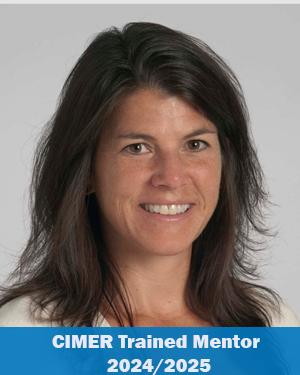Gail Cresci Laboratory
-
Gail Cresci Laboratory
- Principal Investigator
- Research
- Our Team
- Publications
- Careers
- Research News
Research
Biography
Education & Professional Highlights
"CIMER Trained Mentor" indicates the principal investigator has completed mentorship training based on curriculum from the Center for the Improvement of Mentored Experiences in Research, aimed at advancing mentoring relationships and promoting cultural change in research.
Research
Our research focuses on the gut microbiota, centering on clinical situations in which gut dysbiosis occurs with investigations targeting alterations in metabolic byproducts of the gut microbiota. Taking a nutritional therapeutic approach, our ultimate goal is to discover and develop therapies to maintain or restore digestive and gut health that is altered during gut dysbiosis and associated pathologies.
The human intestine houses trillions of commensal bacteria (gut microbiota) dominated by nearly 800 different species. “Healthy” gut microbiota supports epithelial cell health, nutrient metabolism and breakdown, and indirect mucosal defense against pathogenic bacteria. Gut microbiota ferment non-digestible polysaccharides to yield short-chain fatty acids (SCFA), acetate, propionate, and butyrate. Butyrate is the most dynamic SCFA and important for intestinal health. In addition to serving as the primary fuel source for colonocytes, butyrate maintains gut integrity, modulates inflammation and immune function. Without butyrate, intestinal tissue is vulnerable to apoptosis, inflammation, mucosal atrophy and colonic pathology. Our recent work has investigated two known modalities known to induce gut dysbiosis, antibiotic therapy and ethanol consumption. In both these mouse models, oral supplementation with butyrate, in the form of tributyrin, mitigated intestinal injury, maintaining expression of nutrient receptors and transporters as well as preserving intestinal barrier function. Additionally, in the ethanol model, intestinal protection was associated with reduced liver injury. Developing data investigates a targeted approach to positively affect gut luminal butyrate levels and prevent injury through provision of designer synbiotics.
One of our major goals is to identify and characterize the microbial and metabolomic signature associated with the progression of pathologies including alcoholic and non-alcoholic fatty liver disease, chemotherapy-induced mucositis, as well as clinical outcomes and organ integrity in liver and intestinal organ transplant patients and in premature infants.
Our Team
Selected Publications
- Cresci GAM, Mayor PC, Thompson SA. Effect of butyrate and Lactobacillus GG on a butyrate receptor and transporter during Campylobacter jejuni exposure. FEMS Microbiol Lett. 2017 Mar 1;364(6).
- Cresci GA, Glueck B, McMullen MR, Xin W, Allende D, Nagy LE.Prophylactic tributyrin treatment mitigates chronic-binge alcohol-induced intestinal barrier and liver injury. J Gastroenterol Hepatol. 2017 Jan 14.
- Vallabh H, Konrad D, DeChicco R, Cresci G, Lopez R, Steiger E, Kirby DF.Thirty-Day Readmission Rate Is High for Hospitalized Patients Discharged With Home Parenteral Nutrition or Intravenous Fluids. JPEN J Parenter Enteral Nutr. 2016 Aug 18.
- Nagy LE, Ding WX, Cresci G, Saikia P, Shah VH.Linking Pathogenic Mechanisms of Alcoholic Liver Disease With Clinical Phenotypes. Gastroenterology. 2016 Jun;150(8):1756-68. Review.
- Taylor BE, McClave SA, Martindale RG, Warren MM, Johnson DR, Braunschweig C, McCarthy MS, Davanos E, Rice TW, Cresci GA, Gervasio JM, Sacks GS, Roberts PR, Compher C; Guidelines for the Provision and Assessment of Nutrition Support Therapy in the Adult Critically Ill Patient: Society of Critical Care Medicine (SCCM) and American Society for Parenteral and Enteral Nutrition (A.S.P.E.N.).Society of Critical Care Medicine; American Society of Parenteral and Enteral Nutrition. JPEN J Parenter Enteral Nutr. 2016 Feb;40(2):159-211.
- Austhof SI, DeChicco R, Cresci G, Corrigan ML, Lopez R, Steiger E, Kirby DF.Expediting Transition to Home Parenteral Nutrition With Fast-Track Cycling.JPEN J Parenter Enteral Nutr. 2017 Mar;41(3):446-454.
- Ratzlaff R, Nowak D, Gordillo D, Cresci GA, Faulhaber K, Mascha EJ, Hata JS.Mechanically Ventilated, Cardiothoracic Surgical Patients Have Significantly Different Energy Requirements Comparing Indirect Calorimetry and the Penn State Equations.JPEN J Parenter Enteral Nutr. 2016 Sep;40(7):959-65.
- Dowhan L, DeChicco R, Welsh R, Wehner R, Habib M, Hipskind P, Cresci G.Comparison Between Handgrip Dynamometry and Manual Muscle Testing Performed by Registered Dietitians in Measuring Muscle Strength and Function of Hospitalized Patients. JPEN J Parenter Enteral Nutr. 2016 Sep;40(7):951-8.
Careers
Training at Lerner Research Institute
Our education and training programs offer hands-on experience at one of the nationʼs top hospitals. Travel, publish in high impact journals and collaborate with investigators to solve real-world biomedical research questions.
Learn MoreResearch News

Dr. Cresci will explore how increasing levels of two molecules commonly depleted as a result of chronic alcohol exposure may help to rescue pathologies of alcohol use disorder, including bacterial imbalances, leaky gut and increased circulating toxins.
